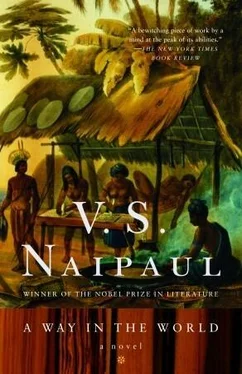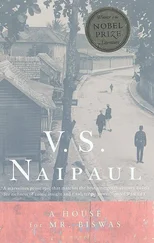He replied beautifully. He was pleased that he had been of help. He had kept his eye on me. He had read reviews of the books I had published; he had read some of my own reviews in the New Statesman (sometimes, he said, he thought I out -Staggered the Staggers ); and he loved the book I had sent him. He invited me to lunch. He belonged, he said, to something which no gentleman could call a club, but which he had become a member of because he had a “pash” on the waitress, who “must have been quite a hit at the Alhambra before the Great War.” I recognized his heavy joking style; I felt it might have been something he had picked up from an older person in his family.
There was no sign of the waitress, but the place (it was in South Kensington, and when I next saw it, some years later, it had been turned into a second-rank hotel) was as decrepit as he had said; there had been no fresh paint or wallpaper since long before the war.
There I noticed what I had noticed four years before: the thin long strands of hair that fell over his forehead and seemed slightly to cobweb his dim eyes. All the time I was with him I wanted to lean across and brush that hair away.
We talked about writing and writers. We had the profession in common now. We could talk — or, at any rate, I could attend — in a more man-to-man way than when we had met four years before. He was contemptuous of C. P. Snow. Of Angus Wilson he said, “If you’re going to leave the British Museum and set up as a writer in the country, at least you should first learn to write a decent sentence.”
Both those writers were very famous at the time. I had read four books by Angus Wilson and one by Snow. I had lost my way in the plottings of the Snow. The Wilson I had read with something like awe. The awe was really for his success. I felt as separate from his English world as — travelling between the BBC and my lodgings, working at the material from the quite different world I carried in my head — I was separate from London and English life.
Literature wasn’t a neutral subject, after all. Background entered into it. So our talk at lunch was unbalanced. He had read an immense amount in the English writing of the century, and he still kept up. I didn’t feel this need. I was too concerned with my own writing, with finding ways of dealing with the — unwritten-about — material I had begun to glimpse four years before.
The other side of this was that I wasn’t worried, as Foster Morris was, by the fame of C. P. Snow and Angus Wilson. And I remember how clearly the thought came to me — the first moment of uncertainty at our lunch, but perhaps really the second or third or fourth uncertainty about Foster Morris — that the careers of Angus Wilson and C. P. Snow were not going to be affected in any way by what was said of them in that dreary dining room.
He gave off a gloom. It began to call up some of my own anxieties, never far away; it dulled the good mood I had brought to our meeting. I took him as I saw him: I didn’t then have the knowledge of England to make a pattern of what he had revealed of his life: the suburban address, the heavy old-fashioned jokes, the visits two or three times a week to publishers’ offices, the occasional review or BBC talk about the thirties. And at that time I didn’t have the gift of enquiry. Perhaps before you start enquiring it is necessary to have a certain amount of knowledge.
I asked him about The Shadowed Livery.
He said, “It was Graham’s idea.” Graham Greene. “He had gone to Liberia the previous year. He thought I should go to the other side of the Atlantic to see where the ex-slaves had come from. He thought I might find a book. I had run into a bad patch.” He paused. “They were a bunch of racial fanatics.”
“Who?”
“Butler and a lot of the crowd around him.”
But he hadn’t written that.
“How could one write that? You have no idea what it was like out there in 1937. The oilfields were like a colony within a colony. Few people outside understood that. A lot of people in Port of Spain didn’t know. Almost all the south of the island was one big oil reserve. There were a lot of South Africans there. I don’t know why. Some of them didn’t mind the strike at all. They loved it when the government asked for volunteers. They could hardly wait to start shooting niggers.”
This touched a memory. One day in 1945—easy for me to date things at school — our English-history teacher, a white-mulatto man, began to talk about the 1937 strike, for no clear reason. I don’t remember all he said. I remember only the rage of his last words: “And I wasn’t going south to shoot niggers.” I had never before heard language like this in the classroom. The teacher was in his late forties. He loved the school, and was a great promoter of good manners and good form. His family was well known; a number of his relations were in good positions in the civil service and city council — in such positions as were open to local people. Something must have taken that sedate man out of himself just before he came into the classroom that day.
Remembering him now, and what he said, I felt Foster Morris’s words about “shooting niggers” hadn’t just come to him, but must have been current among white people in Trinidad in 1937. And I understood again how much of my setting had been hidden from me as a child.
I told Foster Morris about the teacher.
He said, “They didn’t treat people well.” Then he went back to his own thoughts. “You couldn’t go away and write that Butler was a crazy black preacher. That was what the oilfields people were saying. Perhaps it’s the kind of thing you might write nowadays. I don’t know.
“Let me tell you about something that happened not long after the burning of Charlie King. Butler had been arrested, and people were confused. Though I should tell you this: some of them were a little bit on a high after the Charlie King business, wanting things to go forward, even if they didn’t see where they were going. At the same time everyone was frightened. In fact, things were beginning to wind down pretty fast. You could feel that people were getting quieter in themselves.
“There was a little gathering of Butler people one evening. Nothing to do with the strike this time. The opposite, in fact: this was to give people a chance to be together and drink a little rum and forget the trouble they were in.
“We were in a small Trinidad wood house in the country somewhere. Black old wood, corrugated iron, gaps in the plank floors. Oil lamps. In spite of everything, the atmosphere was good. I made notes. Then I simply enjoyed myself. I had got to like the local rum. It was light and nice. And then — it was as if time had jumped — I became aware that the half-white people and the brown people and the one or two Indians had gone away, and that everybody in the little room was black, except for me.
“Why did I feel that? Simple: they made me feel it. I knew a lot of those people very well. They knew where I stood, and once or twice in difficult situations with English officials I had been able to help them. But now the people around me were making racial jokes about me and they weren’t letting go of those jokes. This went on and on. They were like schoolboys. They were ganging up on me. I began to find it hard to keep on smiling. The room was full of big criss-crossing shadows from the oil lamps. The thought came to me that one of those black men might reach out and touch me in this new aggressive way, and then anything might happen. I might be the white Charlie King.
“One of the men was called Lebrun. He was a Trinidadian, but he had grown up in Panama. His family had gone there to work on the Canal, just as the Grenadians had come to Trinidad to work on the oilfields. Lebrun was a communist of a kind you got in the thirties. I actually thought he was the most dangerous man around Butler. He was a fluent Spanish speaker and his business was to travel round Central America and the West Indies and West Africa and talk révolution. He knew how to talk to local people, and at the same time he was able to pitch everything he did and said at some very special people in Moscow or wherever who were his patrons. He was actually a very handsome man, very educated and polished.
Читать дальше












